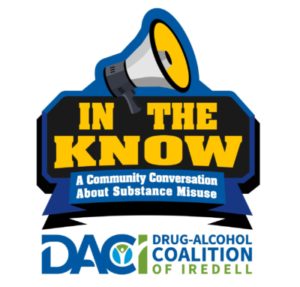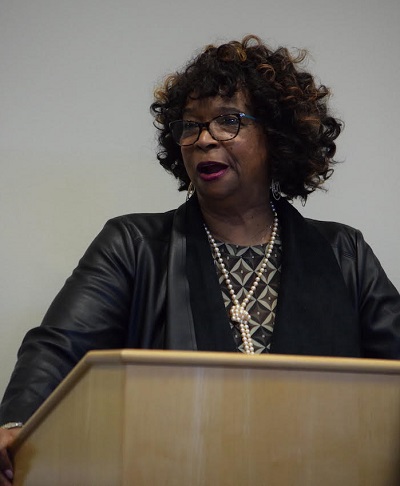
Editor’s Note: This is third part of a three-part series on Drug-Alcohol Coalition Iredell’s recent “In the Know” event.
BY DEBBIE PAGE
Dr. Lonise Bias’s personal journey with substance misuse began in June of 1986 after her oldest son, University of Maryland basketball legend Len Bias, died of cocaine intoxication while celebrating with friends just two days after being selected by the Boston Celtics in the first round of the 1986 NBA Draft.

Forty-two months later, in December of 1990, the Bias family’s second son, Jay, was shot and killed during a dispute.
Though she has been to “hell and back” after the loss of her two sons, Bias said God has given her the “strength and wisdom and the power to encourage others.” She shared her family’s story and her message of hope during the Drug-Alcohol Coalition of Iredell’s recent “Community Conversation on Substance Misuse.”
“The best is still to come. We cannot be weary,” Bias said. “We must keep pressing and pushing.
“The only way to get oil from an olive is to press it. The only way you can get juice from an orange is to squeeze it,” she added. “The only way you can get a diamond from coal is under pressure, and pressure creates diamonds today.”
Following the deaths of Bias’s sons, her grief and broken heart prevented her from seeing the joy to come in her remaining two children, her future six grandchildren, and from knowing her “God-given mission,” she said.
For the past 36 years, Bias, with the support of her husband of 57 years, James, has continued to press on with her anti-drug message. She believes Len, a first team All-American, is in some ways “bigger in death than in life because his death has brought life to so many, a message to stay away from drugs.”
Bias has belief and hope in today’s young people. “They are teachable, reachable, lovable, and savable,” she declared, urging attendees to change their approaches to meet new substance use challenges with innovative strategies.
She urged all to practice “agape — unconditional love.” Since judgment is destructive, instead practice “unconditional caring, respect, and worth because no one knows the invisible wounds another carries.”
“There’s no room for being critical, cynical and judgmental. Bring peace and calm and understanding to help someone get through. Everyone here is your brother’s keeper.”
“This is not the time not to have time. Dr King said that evil will never let go of its hold until it’s met with fanatical resistance.”
Bias conceded that this younger generation is harder to reach, easily bored, visually-centered, and possesses poor face-to-face communication skills.
“They want comfort but no correction, low impact but require high maintenance, want convenience but no commitment, status without service, influence without integrity, success without sacrifice, and want guilt-free living and have a mindset of entitlement.
“With all this being said,” Bias asserted, “I still say they are reachable, teachable, lovable and savable. We must change our approach and adapt to their needs.”
Youth are in this situation because of the constant flow of information, positive and negative, into their brains at an alarming rate. Though have knowledge, but they have little understanding of the consequences of their choices in their teens and early twenties.
Bias said children and teens need adults to give them the things that money cannot buy — a gentle voice and touch and help weeding through that information with love, time, and compassion.
“We have to get to the root of the problem. We can’t use bandages for stuff that requires surgery!” she declared.
To disassemble the old ways, teens need planned regular activities and experiences with good role models. “Good advice with poor example is very confusing. If the blind lead the blind, they both fall in the ditch,” Bias warned.
Adult role models must be authentic and intentional.
Though more money and efforts have been devoted to addressing substance misuse, Bias acknowledged that the problems are deeper and wider than they were 37 years ago when Len died by overdose.
Prevention requires seven things, according to Bias: prayer, partners, plan, passion, patience, peace, and power. “We are battling an energy we cannot see, and we need laborers. We need to get some of these parents off of their apathy,” she said.
A plan with specific strategies and implemented with passion is necessary to reach youths in authentic, real ways. Having patience is important because “we didn’t get into this mess overnight, and we’re not going to erase it, but we want to flatten the line, and that’s going to take time.
“The greatest medication we need today is words and communication.”
“What you are doing is preparing the next generation of leaders. All problems have solutions, but solutions have expiration dates. This room full of champions, brave warriors, strong heroes, but remember that fear prefaces courage.”
Bias challenged the audience to pursue courage, healthy mind, body, and spirit, advocacy, motivation, power and purpose, irresistibleness, offense-mindedness, being notable, and stability.
She urged listeners to stay rooted and grounded in the mission and vision of reducing substance misuse, “no matter how the winds blow.”
“Champions fall down on the ground, but they don’t stay there — they get back up.”
Despite the daunting substance use crisis, Bias concluded that everyone must “be in the know, know where we are going, and remember that the best is yet to come.”
THE CONVERSATION WILL CONTINUE
Throughout 2023, the Drug-Alcohol Coalition of Iredell will present a series of community conversations on substance misuse topics in an effort to inform and educate the community and create advocates for reducing substance misuse in Iredell County.
This conversation is for everyone — the faith community, school employees, business leaders, government leaders, elected officials, law enforcement, first responders, parents, and interested community members — because solving the substance misuse crisis will take everyone connecting and committing to the prevention and treatment cause.
DACI is currently planning its next event focusing on a substance use disorder topic during the spring.
ABOUT DACI
Since 2012, DACI has been committed to the reduction and prevention of substance use, misuse, and overdose deaths and focused on building community awareness, education, and prevention. The group is passionate about providing support and hope for individuals and family member of those struggling with substance use issues.
The coalition is made up of community agencies and non-profits, county agencies, emergency responders, individuals in recovery, law enforcement, mental health providers, elected officials, hospitals and medical professionals, local school systems, faith community, pharmacists, substance use treatment providers, peer support specialists, and concerned community members and family members.
DACI meets the third Monday of each month at the Cooperative Extension Center (444 Bristol Drive in Statesville) from noon to 1 p.m. Lunch is provided.
To get involved or for more information, contact DACI Executive Director Shane Nixon at shane@daciredell.org.
![]()
Related Content
♦ In the Know: Substance misuse increasing across Iredell County (Part I)



